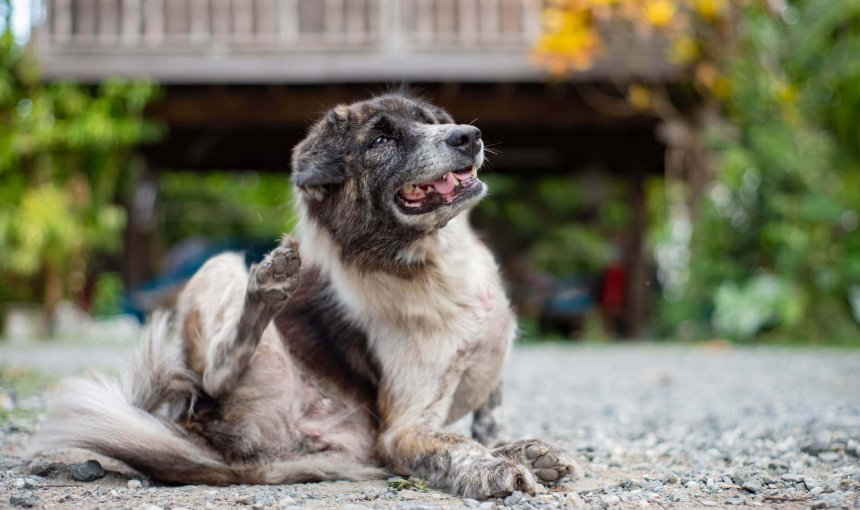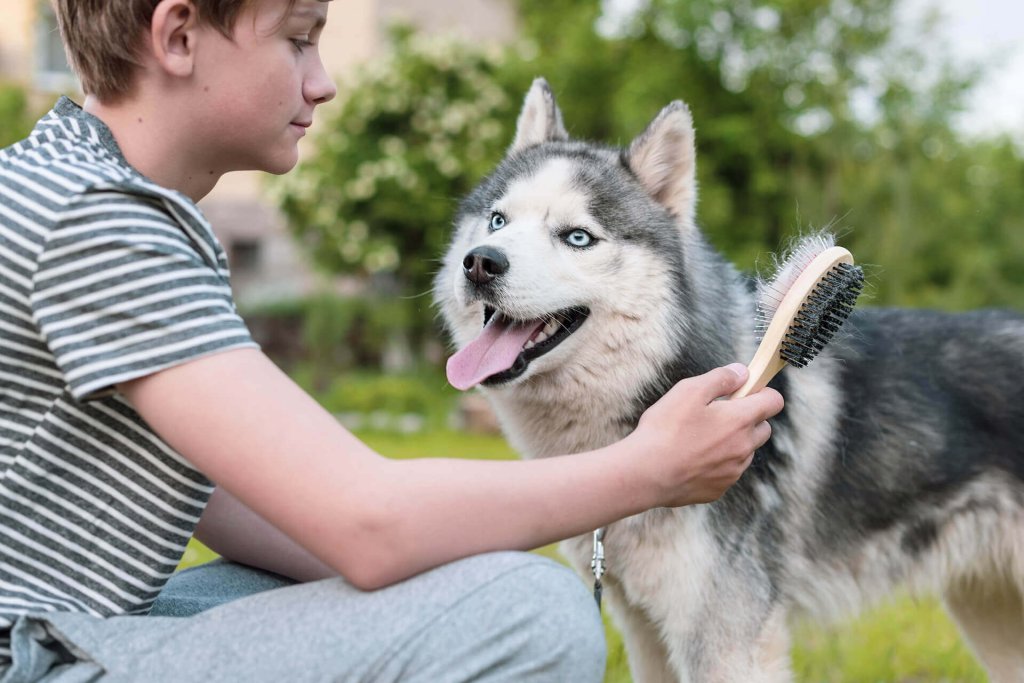Why Is My Dog So Itchy? Causes & Solutions For An Itchy Dog
It's normal for healthy dogs to experience itching sometimes. But if this behavior becomes repetitive or excessive, that's a sign that something may not be right. Find out how to handle itching in dogs in this post.

Ruh roh. If you have an itchy dog, we know it can be worrisome. Your canine buddy may be uncomfortable or downright miserable from the endless scratching. Since excessive itching in dogs is not considered normal, it’s definitely important to find the cause of itchiness in your dog. Is it just normal shedding? Or something more serious? Discover the top causes of itchy skin in dogs, plus prevention and treatment options to help your furry friend feel better soon.
What is pruritus in dogs?
Just like us, our furry friends and other animals can experience itchiness. In the medical world it’s known as pruritus – that sensation that compels us to itch or scratch ourselves in one spot or all over1. Sometimes, it’s harmless. Other times, an underlying condition may be to blame, which may require treatment. Itchiness in dogs can range from mild to severe depending on the cause.
Is it normal for dogs to be itchy?
Well, it depends. Like humans, it’s normal for healthy dogs to itch sometimes. Occasional itching is usually not something to be worried about.
However, if your dog is itching and scratching incessantly, it’s probably an indicator that something’s not right. Your dog may be suffering from fleas, allergies, an insect bite, infection, or something else that needs treatment. So don’t ignore it if your dog starts itching and scratching a lot.
Not sure if you’re dogs scratching is excessive? Then it’s a good idea to monitor your dog closely. Watch their behavior to see if they show the following signs of itchiness in dogs.

Signs of itchiness in dogs
The signs of itchiness in dogs may not be as obvious as you’d think (but then again, sometimes, they might be). Itchy dogs scratch themselves with their paws, but that’s not all. They may also engage in some of the following behaviors in an attempt to scratch the itch:
- Lick one part of their body excessively
- Bite or chew their skin
- Rub against a carpet, floor or wall
- Shake their head (when itchy in the ears)
- Scooting their rear end along the carpet1
If your dog is itchy, they might also have red, inflamed skin or show other signs of illness in dogs. You can assess your dog’s level of itchiness with the Pruritus Visual Analog Scale for dogs.
Once you know your dog is itchy, it’s important to identify the cause.
Causes of itchy skin in dogs
One of the most common causes of itchy skin in dogs is allergic dermatitis or skin allergies. This is also the most common health issue seen in (a sample of) dogs over the past 10 years (according to a report by Nationwide Insurance).
Allergic dermatitis in dogs is when a dog’s body has an allergic reaction to something in their environment or food. Flea bites, mange, ticks, dog pollen allergy, mold spores or dust mites are common culprits. Foods allergies to ingredients such as beef, chicken, eggs, dairy, soy or wheat can also be the cause of skin issues and scratching in dogs.
Your dog may also experience allergic itch in response to shampoos, plants, insecticides, cleaning products or other substances which are toxic to dogs.
If not treated, excessive itching and scratching in dogs can lead to infection, wounds, and pain. So it’s best to schedule an appointment with your vet at the first sign of itching or discomfort in your dog.
Are some dog breeds more prone to itchiness than others?
All dogs can suffer from itchy skin. But purebred dogs are known for having skin issues. For example, Poodles, Cocker Spaniels, Retrievers and West Highland White Terriers commonly experience skin disorders3. Older dogs are also more prone to skin and nail problems.
Treatments, tips and remedies for an itchy dog
Definitely consider the recommendations from your vet when it comes to treating an itchy dog. But here are some other tips, tricks, and remedies for preventing, treating and soothing itchy skin in dogs:
Preventing itchiness and dermatitis in dogs
- Parasite preventatives: Make sure your dog is protected from fleas, ticks and other parasites with the right preventative product – such as a collar, topical solution, or oral medication.
- Outdoor dog bed: Provide your dog with a raised bed to sleep on outdoors to prevent them from coming into contact with environmental allergens.
- Know where your dog goes: Keep an eye on your dog’s location in real time using a GPS dog tracker to make sure they’re not getting into places they shouldn’t be. (Bonus: you’ll probably never have to worry about losing your dog again!)
- Brush your dog regularly: Brushing your dog on a daily or weekly basis (depending on their coat type) helps remove old and dead hair. By supporting your dog’s natural shedding process, you can prevent and reduce itching.
- Good hygiene: Keep your dog clean with regular bathing and grooming to prevent allergens and other substances from irritating the skin and causing itching.
- Hydration: Dehydrated dogs often suffer from dry, itchy skin, so nourish your dog’s skin from the inside by making sure that your dog drinks enough water every day.
- Balanced diet: Another way to prevent and heal itchy skin from within is by feeding your dog a healthy, balanced and natural diet. Consult with your vet before changing your dog’s diet.

Treating itchy skin in dogs
- Allergy shots: If your dog has an environmental allergy, they may benefit from allergy desensitization injections, which can relieve itch for up to 8 weeks at a time4.
- Prescription pill: Drugs like Apoquel are commonly used to relieve allergic itching in dogs; they work quickly but need to be given to your dog daily.
- Antihistamines: Your vet may prescribe antihistamines to treat your dog’s allergy, although a 2016 study found them to be ineffective in relieving itching in dogs.
- Prescription steroids: Corticosteroid treatment may reduce itching in your dog, but could also cause unwanted side effects in your dog.
- Shampoos and oils: Anti-itch products or oils may help relieve itch temporarily, but don’t address the root cause of a dog’s itchy skin.
- Home remedies: To soothe itchy skin immediately, you can try a natural home remedy. These include baking soda, aloe vera, coconut oil, apple cider vinegar, oatmeal and tea treatments. Just be sure to do proper research before attempting to soothe your dog’s itch with these remedies.
Conclusion: Why is my dog so itchy?
If your dog itches a little bit, it might not be anything to worry about. But more frequent itching can be cause for concern. Itchiness in dogs can range from mild to moderate to severe according to the seriousness of the underlying issue. With the help of your vet, you can find the cause of your dog’s itching and decide on the best approach to treat or heal it. Many dogs can fully recover from the itchy problem; however a small percentage of dogs may require lifelong treatment. The best way to prevent itchiness in dogs is to provide good care for your pet using the tips above.




